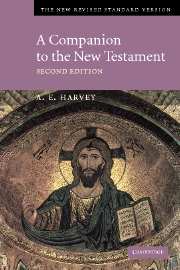Book contents
- Frontmatter
- Contents
- Preface
- Preface to the First Edition (1970)
- THE NEW TESTAMENT
- THE GOSPELS
- THE ACTS OF THE APOSTLES
- LETTERS
- Romans
- 1 Corinthians
- 2 Corinthians
- Galatians
- Ephesians
- Philippians
- Colossians
- 1 Thessalonians
- 2 Thessalonians
- 1 Timothy
- 2 Timothy
- Titus
- Philemon
- Hebrews
- James
- 1 Peter
- 2 Peter
- 1 John
- 2 John
- 3 John
- Jude
- THE REVELATION
- Old Testament References
- Index
- Frontmatter
- Contents
- Preface
- Preface to the First Edition (1970)
- THE NEW TESTAMENT
- THE GOSPELS
- THE ACTS OF THE APOSTLES
- LETTERS
- Romans
- 1 Corinthians
- 2 Corinthians
- Galatians
- Ephesians
- Philippians
- Colossians
- 1 Thessalonians
- 2 Thessalonians
- 1 Timothy
- 2 Timothy
- Titus
- Philemon
- Hebrews
- James
- 1 Peter
- 2 Peter
- 1 John
- 2 John
- 3 John
- Jude
- THE REVELATION
- Old Testament References
- Index
Summary
The ancient city of Corinth, built on the isthmus dividing mainland Greece from the Peloponnese, enjoyed notable prosperity by reason of its commanding position with a port on each side. It had been destroyed by the Romans in 146 bce but refounded by Julius Caesar two centuries later, and had soon after become the capital of the Roman province of Achaia (the whole of central and southern Greece). Because of its commercial importance it had a cosmopolitan population which included a Jewish community – an inscription proves the existence of a synagogue; and the religious and cultural life of the city was typical of the Roman and Hellenistic world, with temples and institutions dedicated to the deities of classical mythology as well as a few of foreign provenance. The constant traffic of seafarers and others through the ports also gave it a persistent reputation for immorality.
The founding of the church at Corinth by Paul around 50 ce is described in Acts 18. Shortly afterwards Paul spent some time at Ephesus (Acts 19). These two chapters of Acts provide the background for what has come down to us as Paul's ‘First Letter to the Corinthians’. But this letter was evidently not the beginning of the correspondence. Paul had already had occasion to write to the Corinthians once before (5.9), and had received a letter from them (7.1). He had also received information from members of the Corinthian congregation who had visited him at Ephesus (1.11; 16.17).
- Type
- Chapter
- Information
- A Companion to the New Testament , pp. 529 - 561Publisher: Cambridge University PressPrint publication year: 2004

